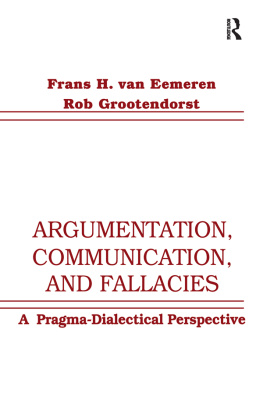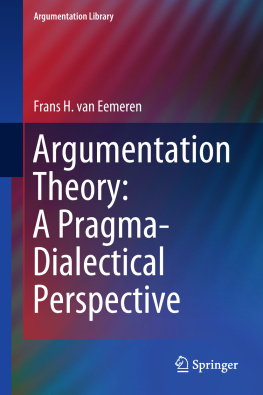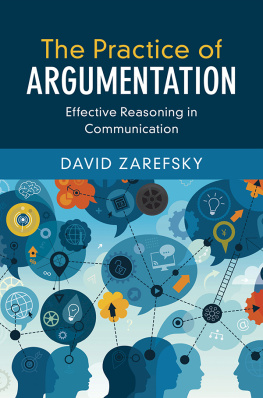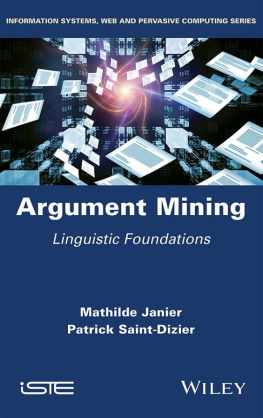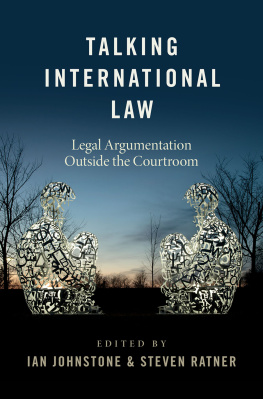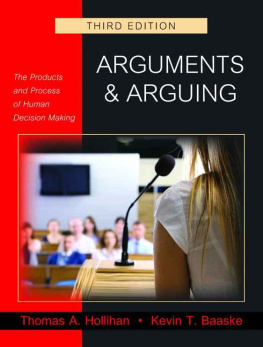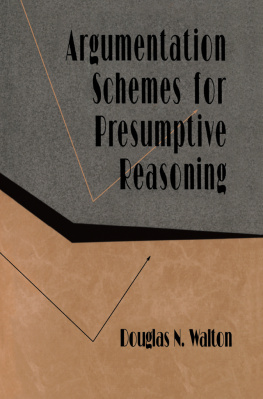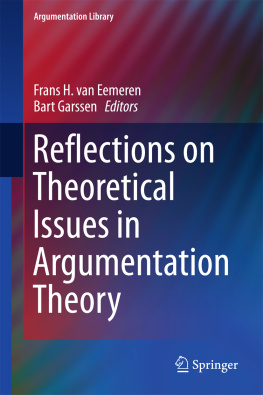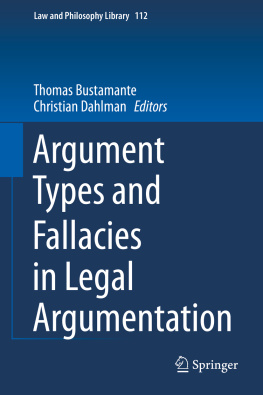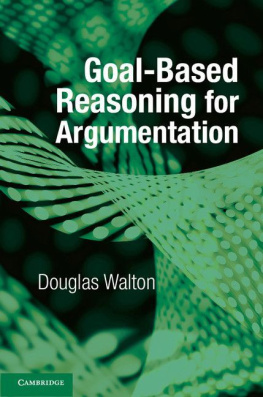ARGUMENTATION, COMMUNICATION, AND FALLACIES
A Pragma-Dialectical Perspective
ARGUMENTATION, COMMUNICATION, AND FALLACIES
A Pragma-Dialectical Perspective
Frans H. van Eemeren
Rob Grootendorst
University of Amsterdam

First published 1992 by Lawrence Erlbaum Associates, Inc.
Published 2016 by Routledge
2 Park Square, Milton Park, Abingdon, Oxon OX14 4RN
711 Third Avenue, New York, NY 10017, USA
Routledge is an imprint of the Taylor & Francis Group, an informa business
Transferred to Digital Printing 2009 by Routledge
Copyright 1992 Taylor & Francis
All rights reserved. No part of this book may be reprinted or reproduced or utilised in any form or by any electronic, mechanical, or other means, now known or hereafter invented, including photocopying and recording, or in any information storage or retrieval system, without permission in writing from the publishers.
Notice:
Product or corporate names may be trademarks or registered trademarks, and are used only for identification and explanation without intent to infringe.
ISBN: 9781138144552 (hbk)
Library of Congress Cataloging-in-Publication Data
Eemeren, F. H. van.
Argumentation, communication, and fallacies: a pragma-dialectical
perspective / Frans H. van Eemeren, Rob Grootendorst.
p. cm.
Includes bibliographical references and index.
ISBN 0-8058-1069-2 (C)
1. Persuasion (Rhetoric) 2. Fallacies (Logic) 3. Speech acts
(Linguistics) 4. CommunicationPhilosophy. I. Grootendorst, Rob.
II. Title.
P301.5.P47E33 1992
401.41dc209140241
CIP
Publishers Note
The publisher has gone to great lengths to ensure the quality of this reprint but points out that some imperfections in the original may be apparent.
Contents
We could not agree more with Gilbert Harman (1986) that there is a difference in category between rules of inference and rules of implication. Reasoned change in view should not be conflated with logical proof of a conclusion. In our opinion, the dissociation from logic should even be carried one step further. If it is argumentative inference that we are interested in, reasoned change is to be put in the context of communication where one party attempts to convince the other party of the acceptability of a standpoint. This does not mean that logic has no part to play in the study of argumentation. A difference of opinion can only be resolved if the argumentative discourse complies with a variety of norms for critical discussion. Logical validity has its own proper place among the multifarious norms incorporated in the rules for critical discussion.
In Argumentation, Communication, and Fallacies, a critical discussion is conceived of as an interactional procedure aimed at resolving a difference of opinion through a regular exchange of speech acts. The book provides an outlook on a theoretical framework for analyzing and evaluating argumentative discourse as a critical discussion. Particular attention is paid to the things that can go wrong in the various stages of the critical discussion. It is shown that the verbal moves that are traditionally known as fallacies can be regarded as specific violations of the rules for critical discussion.
Our general aim in this book is to elucidate, on behalf of colleagues and interested students, our own pragma-dialectical perspective on the analysis and evaluation of argumentative discourse, which brings together pragmatic insight concerning speech acts and dialectical insight concerning critical discussion. Although we frequently refer to the literature, at this stage, we refrain from making detailed comparisons with other approaches. Such contrasting reviews simply have to wait. The same goes for expounding on further elaborations and applications of our approach. We trust that those who care about method will appreciate that we have set these limits to our ambitions.
ACKNOWLEDGMENTS
First, we would like to acknowledge that a substantial part of this book is based on work we have done with Tjark Kruiger at the University of Amsterdam. By their valuable and detailed comments on earlier versions of the manuscript, Trudy Govier and John Woods helped us further in focusing the book. We wish to thank them for the stimulating discussions we had with them during their stay in our department in 1987 and 1988. We are also grateful to Maurice Finocchiaro and Charles Willard for giving their careful attention to the manuscript and to Anthony Blair for his thoughtful reactions to some of our contentions.
The work on this book was supported by our fellowships at the Netherlands Institute for Advanced Study in the Humanities and Social Sciences (NIAS). We are greatly indebted to the Royal Netherlands Academy of Arts and Science for giving us the opportunity to set up a Nucleus Group on Fallacies as violations of rules for argumentative discourse and to spend the academic year 19891990 in the company of argumentation experts at NIAS.
The members of the NIAS group, Douglas Walton, John Woods, Scott Jacobs, Sally Jackson, Agnes Haft-van Rees, Agnes Verbiest, and Charles Willard, encouraged us to finish the book by making useful suggestions to that intent. We hope that they will find that the final result testifies to our ability to make good use of their sometimes radical and undermining remarks.
Eveline Feteris, Fellow of the Royal Netherlands Academy of Arts and Science, and our research assistants Rinke Berkenbosch, Susanne Gerritsen, Peter Houtlosser, Willem Koetsenruijter, Pauline Slot, Francisca Snoeck Henkemans, and Erik Viskil helped us in completing the notes and the bibliography. Thanks are also due to the anonymous referees of Lawrence Erlbaum Associates.
Frans H. van Eemeren
Rob Grootendorst
PART I
ARGUMENTATION AND COMMUNICATION
CHAPTER 1
The Pragma-Dialectical Approach
In the past decade, the study of argumentation has developed into a field of study in its own right.
In North America as well as in Europe the study of argumentation has for a long time been dominated by the works of Toulmin and Perelman. Both Toulmin and Perelman tried to present an alternative to formal logic that is better suited to analyzing everyday argumentation. Both did so by taking the rational procedures of legal reasoning as a model to start from. In our opinion, however, the result is in neither case quite satisfactory. This is at least partly due to their ill-considered prejudice that for the analysis of argumentation logic has nothing to offer. Without paying any attention to modern developments, formal logic is equated with classical syllogistic logic or, just like that, declared inapplicable to ordinary arguments.
More importantly, for their parts, Toulmins and Perelmans alternatives just as much fail to recognize argumentation as a phenomenon of ordinary language use that should be treated as such. By dealing with isolated arguments, and neglecting the pragmatic aspects of the verbal and nonverbal context of the speech event in which they occur, as for an alternative to formal logic Toulmin and Perelman have less to offer for the study of argumentation than they claim.
In The Uses of Argument, Toulmin (1958) provides a model that is supposed to reflect the structure of arguments. His model constitutes a description of the procedural form of arguments. According to Toulmin, this procedural form is field-independent, that is, independent of the nature of the issues to which the argumentation refers. The soundness of argument is, in his view, not primarily determined by its procedural form, but depends on the extent to which the backing renders the warrant acceptable. As the content of a backingas opposed to its formis related to the nature of the issue to which the argument pertains, Toulmin concluded that the criteria used in assessing the soundness of arguments must be field-dependent.

